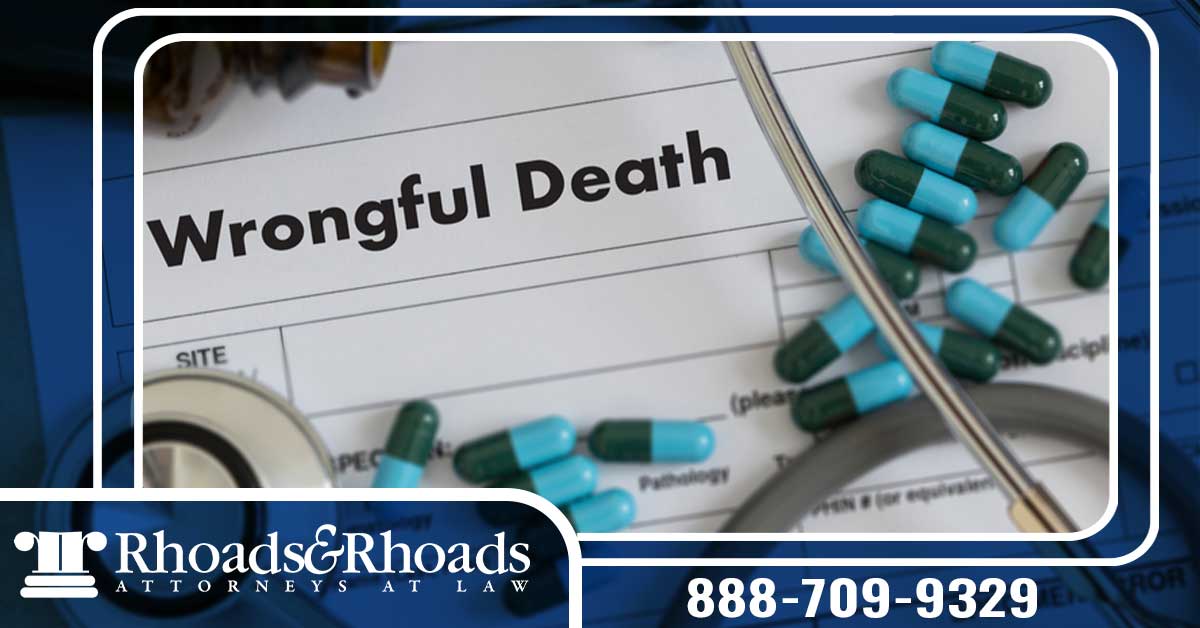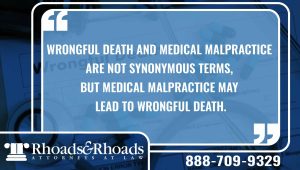
Every year, hundreds of thousands of people die due to medical mistakes. In fact, it’s the third-leading cause of death in the United States. While not all medical errors are considered malpractice, negligence in the healthcare industry is still tragically common and often results in victims’ deaths.
If you’ve lost a loved one due to medical negligence, we are so sorry for your loss. Losing a family member is unthinkably tragic and is also often confusing. You may wonder what rights you have for compensation from the responsible parties, and you may also have questions regarding whether there’s a difference between medical malpractice and wrongful death.
Here at Rhoads & Rhoads, we represent victims of medical malpractice and wrongful death as well as their families. In this blog, we’ll answer common questions regarding these legal concepts, including the differences, who can file, the statute of limitations, and how to prove medical malpractice and wrongful death claims.
If you have further questions, don’t hesitate to contact us and receive a free case review today to pursue a wrongful death suit.
Is Wrongful Death and Medical Malpractice the Same?

Wrongful death and medical malpractice are not synonymous terms, but medical malpractice may lead to wrongful death. Wrongful death occurs when a victim dies due to another party’s negligence or deliberate wrongful act. This can include medical malpractice — which we expand on below — or may result from another irresponsible or immoral act. While no amount of money can fill the void of a loved one’s death, you can open a wrongful death lawsuit to compensate you for damages.
Types of Wrongful Death Claims
Many different accidents and deliberately harmful acts can lead to a person’s death.
In addition to medical malpractice, common types of wrongful death cases include:
- Car Accidents
- Truck Accidents
- Semi-Truck Accidents
- Violence
- Premises Liability, such as slip and falls
- Product liability
- Dog Bites
- Work Accidents
- Nursing Home Negligence and Abuse
Who Can File a Wrongful Death Claim?

The personal representative, usually a family member who wishes to handle the estate or who may be identified in the will may file a wrongful death claim in civil court. They’re also responsible for protecting the victim’s estate during the probate court process.
While it’s the responsibility of the family member or close family friend who seeks to be named as the personal representative to file a wrongful death suit, the deceased person’s surviving family members will receive the financial compensation.
The way in which the civil court will distribute these funds to surviving family members is usually as follows:
- The spouse of the deceased victim will receive all of the money if they didn’t have children or heirs.
- In the event the victim had both a spouse and children, they will split the settlement in half. The spouse will receive 50% and the other 50% will be divided equally among the children.
- If the victim didn’t have a spouse, their children will recover all of the compensation.
- When a victim doesn’t have children or a spouse, their parents receive the settlement.
- If the victim didn’t have a spouse, children, or surviving parents, the settlement will be allocated in accordance to the probate court laws, usually to the victim’s next in line family members.
What Is Medical Malpractice?
Medical malpractice occurs when doctors, nurses, or other healthcare professionals engage in a negligent act or omission or cause deliberate harm to a patient in their care. This negligence may result in wrongful death or personal injuries.
What Qualifies As Medical Malpractice?
While a loved one’s death is heartbreaking, their passing doesn’t necessarily mean that the medical professional was at fault. Further, an injury that results from medical complications doesn’t inherently indicate that the healthcare provider was negligent. Whether or not it can be considered medical malpractice will depend on the circumstances surrounding the event.
Let’s say that a 90-year-old man with a history of heart disease suffers from a heart attack while in the hospital. The hospital staff can do everything in their power to save the patient, but they may still die. In this scenario, it’s very unlikely someone could successfully pursue compensation because the medical provider and staff didn’t engage in negligence of..
On the other hand, suppose a patient goes to the hospital for a low-risk, routine operation, such as a tonsillectomy. The medical provider makes a mistake when admitting the patient for surgery and confuses them with a diabetic scheduled for a foot amputation.
In this frightening scenario, the victim suffered a catastrophic injury due to the healthcare provider’s negligence and could pursue compensation through a personal injury lawsuit (medical negligence or malpractice) and may even recover punitive damages.
Another critical note is that medical errors are exceedingly common and not all occur due to negligence or willful harm. For instance, a surgeon may make a mistake that leads to a patient’s death, but if their actions didn’t deviate from medical standards, they may not be considered accountable in a wrongful death case.
Types of Medical Negligence
Common types of medical malpractice cases include:
- Misdiagnosis
- Failing to diagnose
- Delayed treatment
- Surgical errors
- Anesthesia errors
- Childbirth injuries
- Prescription errors
- Unsanitary medical instruments causing infection
While these are some of the most common types of healthcare provider negligence, there are many other ways in which a healthcare provider may be negligent. Medical malpractice leads to a wide range of complications that may result in fatal injuries. If you’ve lost a loved one, it’s important to hire a wrongful death lawyer to assist you with your legal claim.
If you’ve been personally victimized by a negligent medical professional, you have every right to file a medical malpractice lawsuit to pursue compensation for medical bills, lost wages, mental anguish, emotional distress, and more.
With the help of experienced medical malpractice attorneys, you’ll have a much greater likelihood of recovering fair compensation for your personal injury claim. A seasoned attorney can help you through the legal process, as they have years of experience handling personal injury cases.
Proving Medical Malpractice and Wrongful Death
To bring a wrongful death action, your attorney must provide sufficient evidence to prove that the defendant was responsible. He/She may file against an individual, such as a surgeon or nurse, or a facility, such as a hospital, rehabilitation facility or nursing home. While the personal representative can file the claim without a wrongful death attorney, it’s best to hire one because they have expertise in proving these cases and properly file.
This also applies if you file a medical malpractice claim for a personal injury. You’ll need to be able to provide sufficient evidence that the defendant was directly responsible and negligently caused your injuries and resulting damages. In order to win medical malpractice lawsuits, plaintiffs must prove four key elements.
Elements of Proof In Medical Malpractice and Wrongful Death Cases
The first element to prove in the medical malpractice case is that the defendant owed a duty of care to you or your deceased loved one. This means that you or the deceased victim was a patient in the defendant’s care. There must be a formal professional relationship between the defendant and the patient. The defendant, whether a doctor, hospital, nurse, etc., owed a duty to the victim.
Next, you need to establish that the medical professional breached their duty and was negligent in providing sufficient care. This could mean negligently misdiagnosing, performing unnecessary surgery, using outdated methods, carrying out duties while under the influence, or anything else that strays from accepted medical standards.
A medical professional or facility breaching their duty isn’t enough, though — the breach needs to have directly caused significant personal injuries or a victim’s death.
Finally, you need to show that the injury or death resulted in damages.
What Damages Can I Recover From a Medical Malpractice Claim?
 If you win a personal injury or wrongful death case after taking legal action, you’ll be able to recover compensation for various types of damages. This will likely be economic damages, meaning damages intended to reimburse monetary expenses, and non economic damages (pain and suffering or loss of consortium) which compensate for damages that have no inherent monetary value.
If you win a personal injury or wrongful death case after taking legal action, you’ll be able to recover compensation for various types of damages. This will likely be economic damages, meaning damages intended to reimburse monetary expenses, and non economic damages (pain and suffering or loss of consortium) which compensate for damages that have no inherent monetary value.
Types of economic damages include:
- Medical bills & Medical expenses
- Financial support after the loss of a spouse or parent
- Funeral expenses
- Burial costs
- Lost wages
- Lost earning capacity
Non economic damages include:
- Pain and suffering (physical and mental anguish)
- Loss of consortium
- Loss of spouse
- Loss of a parent
- Reduced quality of life
- Emotional distress
Additionally, if the medical professional or facility’s actions were especially egregious, the victim or their family may be able to recover punitive damages. These damages primarily aim to punish the defendant while also dissuading others from engaging in similar behaviors. These damages are exceedingly rare.
What Are the Statutes of Limitations For Medical Malpractice Claims and Wrongful Death?
The statute of limitations for medical malpractice and wrongful death action varies from state to state. In Kentucky, your personal representative only has one year to file a wrongful death lawsuit after your loved one’s passing or one year from the date of appointment of the administrator or executor of the state. Similarly, you only have a single year to file a medical malpractice lawsuit and a claim of loss of spousal consortium.
After the statute of limitations, you won’t be able to recover compensation for a medical malpractice personal injury or wrongful death claim.
The Challenge of Proving Wrongful Death and Medical Malpractice
One major difference between medical malpractice and other types of injury and wrongful death lawsuits is that they’re often far more difficult to prove. After all, health care providers treat thousands of patients and may be accused of making mistakes often, and you need to be able to prove that they actually were negligent in some way. The healthcare provider’s legal team will likely argue that the medical care your family member received was in accordance with acceptable standards. Because your wrongful death claim will be challenging, you must consult with a wrongful death lawyer and various expert witnesses are required.
Do I Need an Attorney to File a Wrongful Death Lawsuit?
As we’ve mentioned, victims are not required to hire attorneys for wrongful death and medical malpractice cases. That said, an experienced medical malpractice attorney will help you prove your case and recover resulting damages. The attorney client relationship is critical in these cases, as a seasoned lawyer will help you gather evidence and prove your claim on your behalf.
Here at Rhoads & Rhoads, our experienced attorneys are experts in medical malpractice and wrongful death cases. We can help you win your case and will work to maximize your compensation.
Call us today at 888-709-9329, or you can schedule your free consultation online here.


